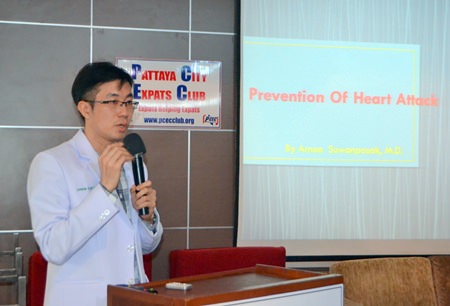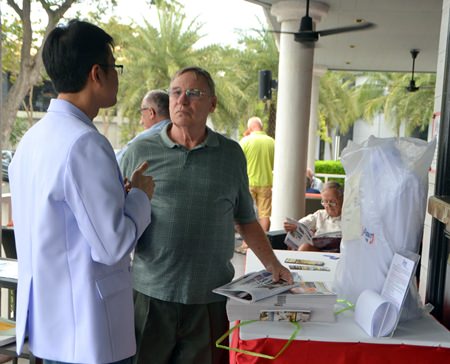Heart attacks are a serious business. The best way to avoid them is to try to prevent heart disease. Dr. Arnon Suwanpasak, from the Heart Centre of Bangkok Hospital Pattaya (BHP), spoke about preventing heart attacks at the Pattaya City Expats Club (PCEC) meeting on Sunday, February 15. At Bangkok Hospital Pattaya, Dr. Arnon specializes in Cardiology and Cardiovascular MRI. In 2013, he received his Certificate in Cardiovascular MRI from Washington University in St. Louis, Missouri, U.S.
Coronary artery disease – or, more simply, heart disease – is the number one killer in the U.S., affecting more than 13 million people. Dr. Arnon explained that heart disease is a result of plaque build-up in your arteries, which blocks blood flow and heightens the risk of a heart attack. Risk factors include obesity, diabetes, hypertension, smoking, high blood cholesterol levels, physical inactivity and excessive stress. Men are at greater risk than women. A family history of heart disease is associated with a higher risk of coronary artery disease, especially if a close relative developed heart disease at an early age.
 Dr. Arnon Suwanpasak from Bangkok Hospital Pattaya introduces his topic “Prevention of Heart Attack” to members and guests at the PCEC’s Sunday meeting.
Dr. Arnon Suwanpasak from Bangkok Hospital Pattaya introduces his topic “Prevention of Heart Attack” to members and guests at the PCEC’s Sunday meeting.
When someone comes to a hospital complaining of chest pain, he said the initial working diagnosis is acute coronary syndrome, which is an umbrella term for situations where the blood supplied to the heart muscle is suddenly blocked; one or more diagnostic tests are usually performed to determine the precise problem.
The first test (and sometimes the only test you need) is an ECG (electrocardiogram) which measures the heart’s electrical activity. ECG testing is used to differentiate between two types of heart attacks based on the appearance of the tracing on the ECG charts. A section of tracing higher than the baseline is called an ST elevation MI (STEMI), which usually requires more aggressive treatment. Immediate treatments for a suspected STEMI often include aspirin, which prevents further blood from clotting; nitroglycerine, sometimes given to treat chest pain; and oxygen. STEMI is then treated with reperfusion therapy which involves restoring circulation to the heart. Typical methods are angioplasty, where the arteries are pushed open with a balloon or stent – also referred to as “primary PCI” (percutaneous coronary intervention) – and thrombolysis, where the blockage is removed using medications.
 After his presentation, Dr. Arnon Suwanpasak takes time to converse with members and guests. Here he converses with PCEC Club member David Meador.
After his presentation, Dr. Arnon Suwanpasak takes time to converse with members and guests. Here he converses with PCEC Club member David Meador.
The other type of heart attack is called non-STEMI. If the ECG does not reveal STEMI, a diagnosis of non-STEMI is confirmed by a blood test to measure whether heart cells are dying. Non-STEMI may be managed with medication, although angioplasty may be required if the person is considered to be at high risk.
It is important that treatment be provided within two hours of the onset of symptoms. So, people who experience symptoms are advised to get to hospital as quickly as possible; that usually means calling for emergency medical services (EMS) – i.e. an ambulance (in Pattaya, call 1719 for BHP’s ambulance). If the patient can’t get to a hospital in time because of heavy traffic, Dr. Arnon suggested you head for the nearest medical clinic. Most of them are equipped with ECGs. If you are stuck in traffic, another good strategy is to administer CPR (cardiopulmonary resuscitation) to the patient.
Also, if the EMS cannot get someone to a hospital within 60 minutes, the patient may be administered pre-hospital fibrinolysis at the first opportunity. These are medications that prevent blood clots from growing.
 Ren Lexander from Pattaya Mail TV interviews Dr. Arnon Suwanpasak about his informative presentation to the PCEC on prevention of heart attacks. To view the interview, visit: https://www.youtube.com/watch?v=i3tQja98BLM
Ren Lexander from Pattaya Mail TV interviews Dr. Arnon Suwanpasak about his informative presentation to the PCEC on prevention of heart attacks. To view the interview, visit: https://www.youtube.com/watch?v=i3tQja98BLM
If too many stents or balloons are needed to keep the arteries open, surgeons will perform a coronary bypass. Coronary bypass surgery is a procedure that restores blood flow to your heart muscle by diverting the flow of blood around a section of a blocked artery in your heart.
Although chest pain may be the most common symptom, Dr. Arnon explained that not everyone with heart disease experiences chest pain. This is especially true for the elderly and for diabetics. Other symptoms include pain or discomfort in one or both arms, the jaw, neck, back or stomach; shortness of breath; feeling dizzy or light-headed; nausea; and sweating.
Dr. Arnon described the major prevention strategies: smoking cessation; controlling cholesterol levels; blood pressure control; weight reduction; exercise; stress reduction; and aspirin and other medicines (including an annual flu shot). Stopping smoking, he explained, can reduce the risk of a coronary event by 50% within 1-2 years. For people who have had a heart attack, stopping smoking can reduce the risk of a second attack also by 50%.
He mentioned that most people should aim for blood pressure readings of 140/90 or lower, but that persons with diabetes or chronic kidney disease should aim for 130/80 or lower. Further, with respect to weight management, men should aim for a waist circumference of less than 40 inches, and women less than 35 inches. Dr. Arnon recommended a balanced diet, but with limited intake of salt, red meat, alcohol, soft drinks, fruit juices, fatty foods like cheese, and sugary deserts or snacks like donuts.
 PCEC Member Bob Erends appears to be enjoying having his blood pressure checked by the nurse from Bangkok Hospital Pattaya. The hospital usually sends a nurse along with the hospital’s speaker to give free blood pressure checks for members and guests.
PCEC Member Bob Erends appears to be enjoying having his blood pressure checked by the nurse from Bangkok Hospital Pattaya. The hospital usually sends a nurse along with the hospital’s speaker to give free blood pressure checks for members and guests.
Dr. Anon said that women who have had heart attacks should avoid hormone therapy involving estrogen. He said that all persons who have had a heart attack should not use antioxidant vitamin supplements (e.g. vitamins E, C or beta carotene) or folic acid for secondary prevention.
After the presentation, MC Richard Silverberg brought everyone up to date on upcoming events and called on Roy Albiston to conduct the Open Forum, where questions are asked and answered about Expat living in Thailand, especially Pattaya.
For more information on the PCEC’s many activities, visit their website at www.pcecclub.org.




